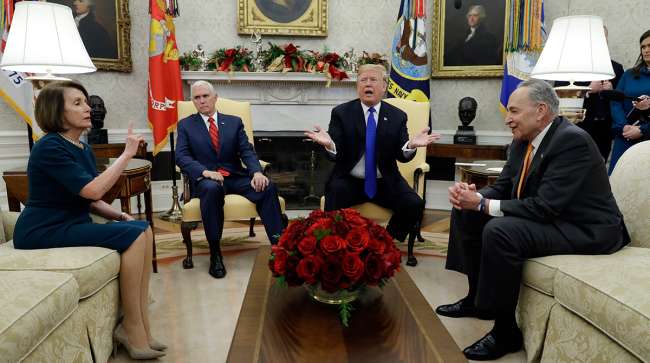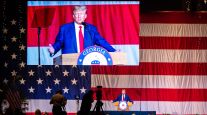Senior Reporter
Border Wall Hinders Funding Negotiations as Trump Threatens Shutdown

The threat of a partial government shutdown that would ensnare transportation programs looms as congressional Republicans and Democrats continue to disagree about President Donald Trump’s funding request for a wall along the U.S. border with Mexico.
If lawmakers fail to advance a fiscal 2019 appropriations measure or a short-term spending fix by Dec. 21, funding for programs at the U.S. Department of Transportation — as well as other departments and agencies that oversee commerce, the environment and financial services — would be disrupted.
For instance, about 30% of DOT’s workforce would be furloughed, and 53,000 Transportation Security Administration staff would have to work without pay, Democrats on the Senate Appropriations Committee noted.
“By manufacturing a crisis over his wall, President Trump appears willing to shutter the doors of the … Department of Transportation, among others,” said Sen. Patrick Leahy of Vermont, the top Democrat on the Appropriations Committee. “He wants hard-working American taxpayers, not Mexico, to write him a check for $5 billion more, or he will shut the government down? Come on.”
If Congress does agree to advance House and Senate versions of the fiscal 2019 transportation funding bill, policy that would deny funding for certain requirements for electronic logging devices pertaining to livestock haulers would be approved.
This year, the livestock haulers industry raised concerns about ELD rules to members of Congress. The ELD mandate went into effect in December 2017. It requires commercial carriers to equip their trucks with ELDs to record hours of service.
Separately, senior Senate aides tell Transport Topics that autonomous vehicles policy legislation that does not include trucking-centric provisions is unlikely to advance in the lame-duck session.
Republican leaders insist their aim is to avoid a shutdown while acknowledging little progress since the recent enactment of a short-term funding measure keeping federal agencies operating through Dec. 21.
“We don’t know how long the discussion over the government funding issue is going to go on,” Senate Majority Leader Mitch McConnell (R-Ky.) told reporters Dec. 11. His leadership team is pressing their Democratic counterparts over Trump’s $5 billion request for a border wall that the president had said Mexico would fund.
McConnell’s remarks came soon after Trump hosted congressional Democratic leaders at the White House. During the combative meeting with media present, the president expressed a commitment to fund the border wall even if it meant temporarily halting federal programs.
“I will be the one to shut it down. I’m not going to blame you for it,” Trump said, speaking to Senate Minority Leader Chuck Schumer (D-N.Y.) “I’m going to shut it down for border security.”
Schumer said his caucus did not want to shut down the government. Most Democrats on Capitol Hill would support considerably less funding than Trump’s request for border security programs.
After the meeting with the president, incoming House Speaker Nancy Pelosi (D-Calif.) criticized the sentiment about a shutdown. As she put it, “The ‘Trump Shutdown’ is something that can be avoided, that the American people do not need, at this time of economic uncertainty, people losing jobs, the market in a mood and the rest.”
When the new Congress convenes in January, Democrats will manage the House and Republicans will keep control of the Senate.
McConnell will continue to serve as Senate leader. Pelosi is expected to be elected speaker for the second time during her service in Congress after she agreed to limit herself to two terms. This action was meant to calm concerns from newly elected members of the Democratic caucus who are seeking to change the status quo in Washington.



